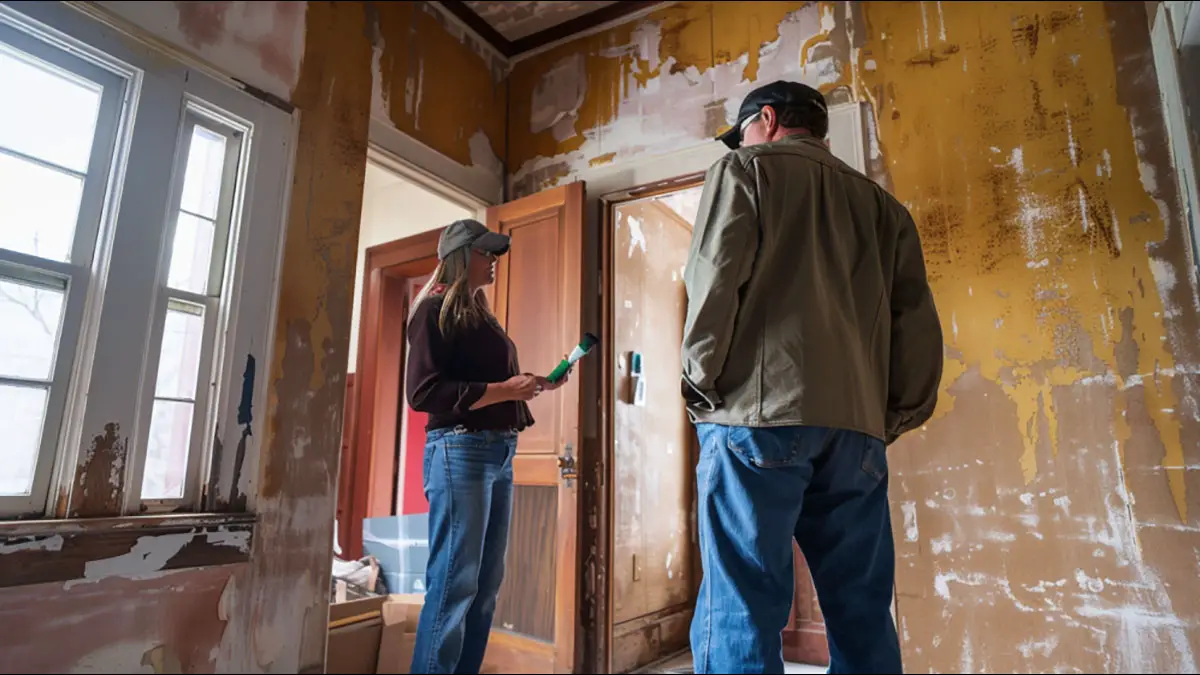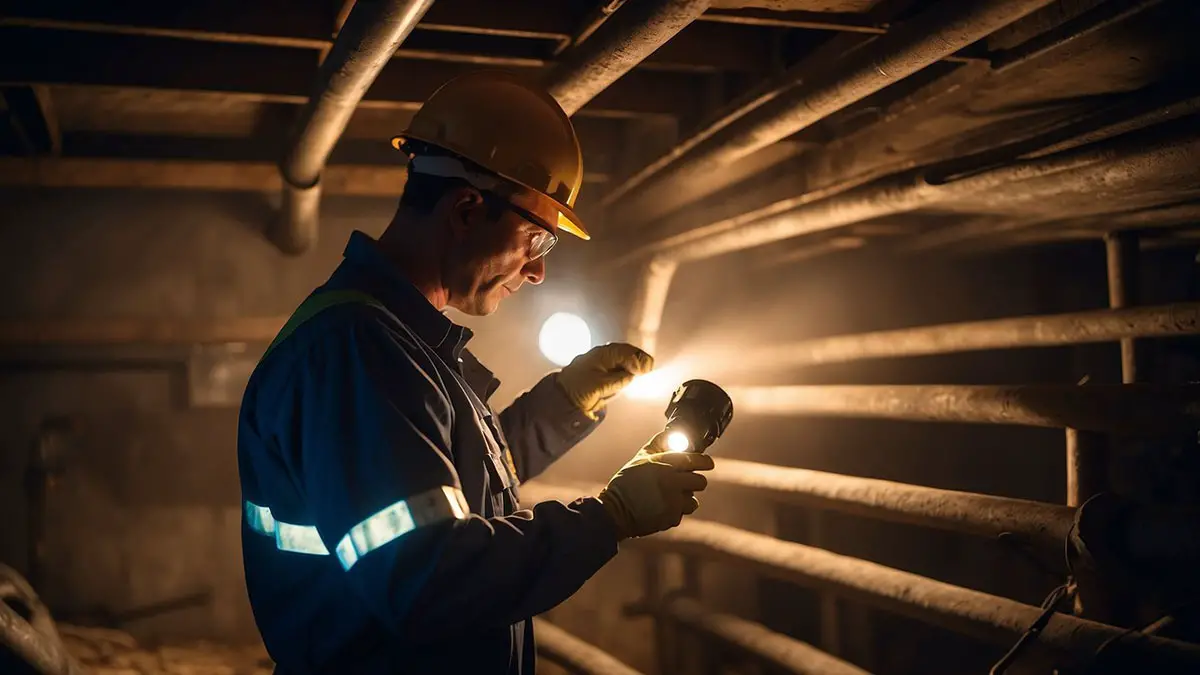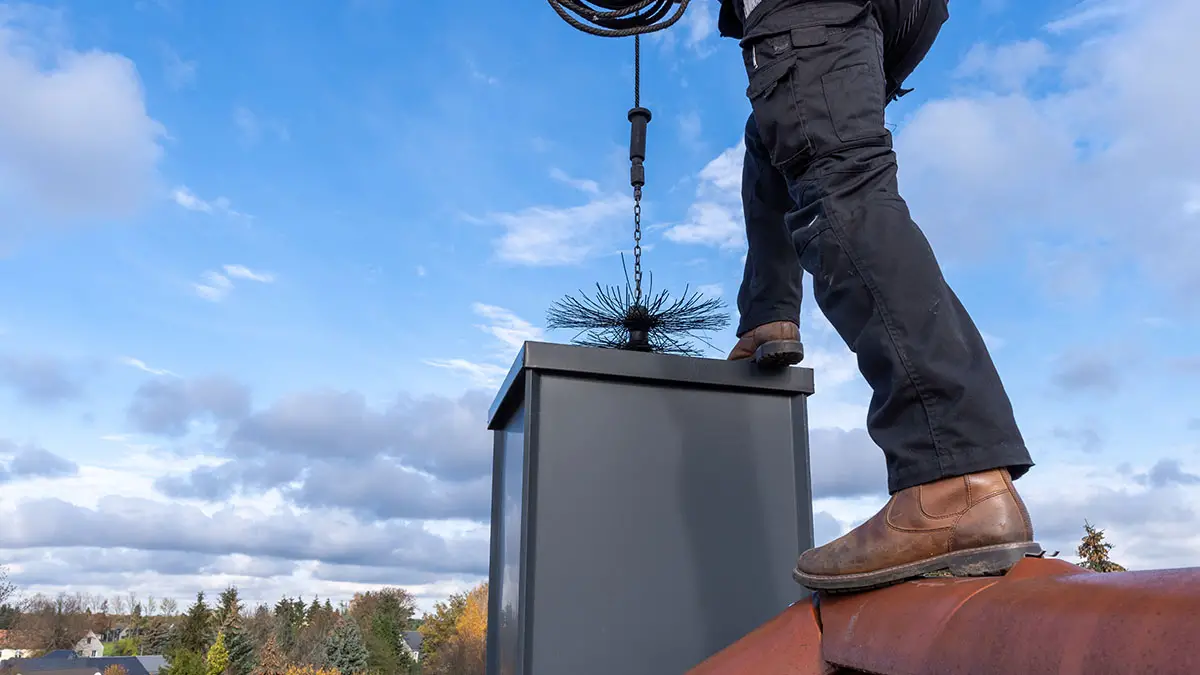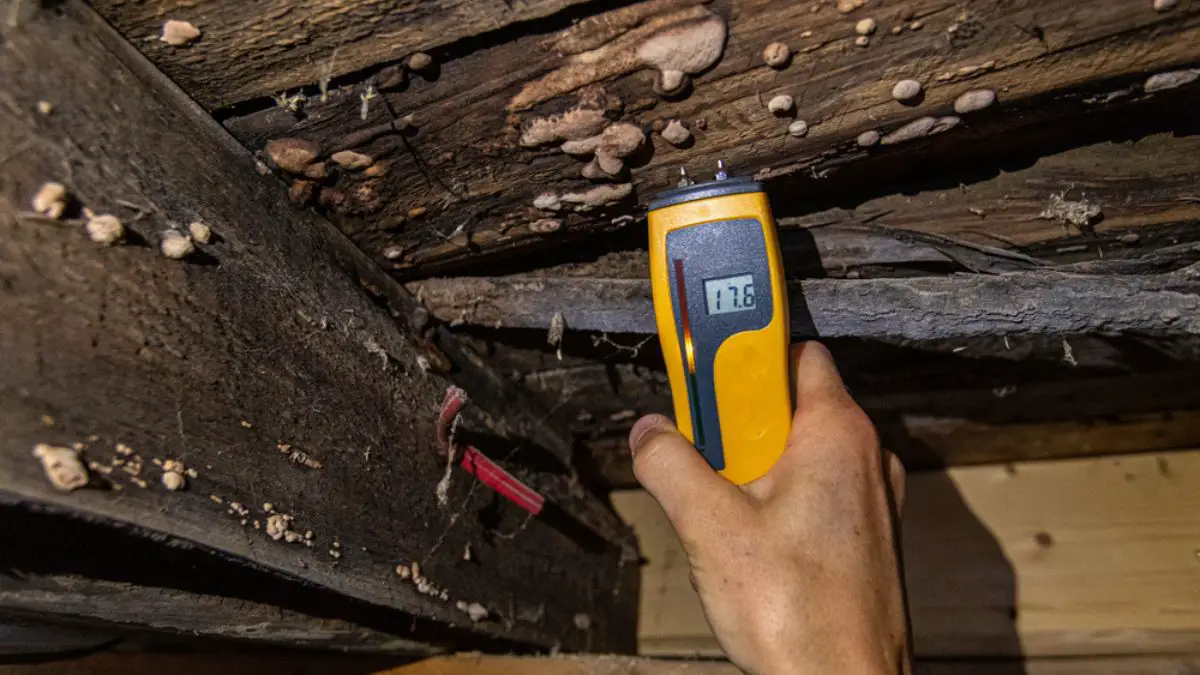Thinking about the problems that can fail a home inspection is scary. Your licensed home inspector may identify red flags like safety issues, major defects, and expensive repairs.
Home inspection checklist issues like faulty outlets, water spots indicating leakage, or an improper slope causing water to seep towards the property’s ground and into the basement raises concerns.
Home inspections aren’t about passing or failing. Discovering a significant issue, such as mildew caused by damp materials, by a professional home inspector can often be a deal breaker. On the bright side, avoiding problematic houses saves you money in the long run.
Occasionally, a home inspection uncovers one or more serious problems that need addressing. These issues, like damage caused by tree roots, must be resolved or negotiated for the sale to proceed.
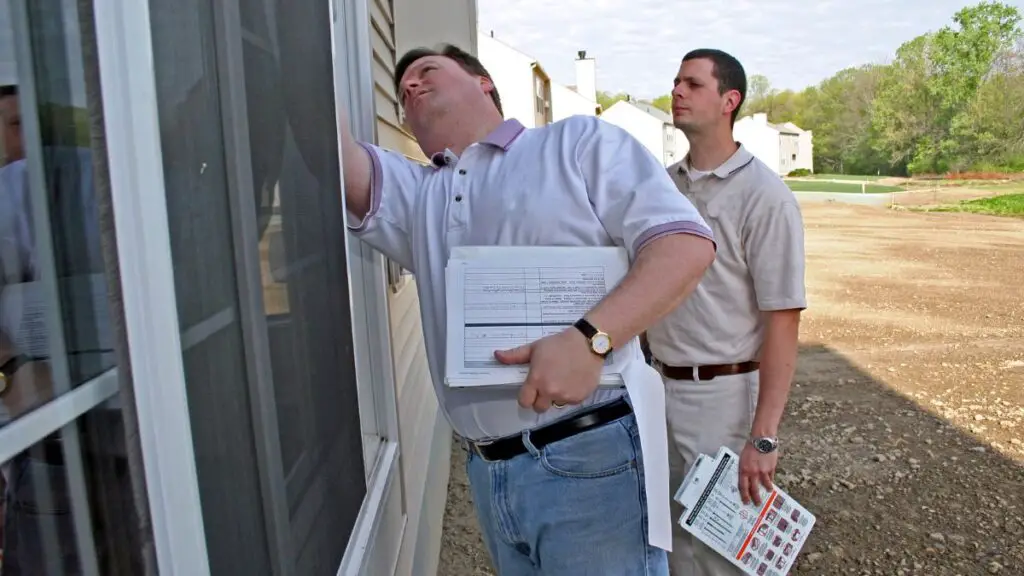
Things that Fail a Home Inspection
A thorough inspection is essential to ensure the property is in good condition and free from major issues. A home inspector can reveal things that fail a home inspection that may affect the house’s safety, functionality, and value.
Most home inspection fails because of structural problems that cost thousands of dollars to repair. These types of inspection issues can harm a potential buyer financially. While inconvenient, common issues, like faulty appliances, can be easily replaced. More serious problems, like cracked foundation issues, could negatively impact the home’s sales price.
Safety issues like missing smoke or carbon monoxide detectors are minor issues that can be made right. Signs of water damage often indicate long-term problems or neglect.
To avoid failing a home inspection, many underhanded sellers and contractors use unhanded tactics to pass a home inspection. Qualified home inspectors are good at catching many of these tricks to pass home inspections.
Being aware of these potential issues, like mildew spots or loose outlets, buyers can confidently approach the home buying process and make informed decisions about their investment.
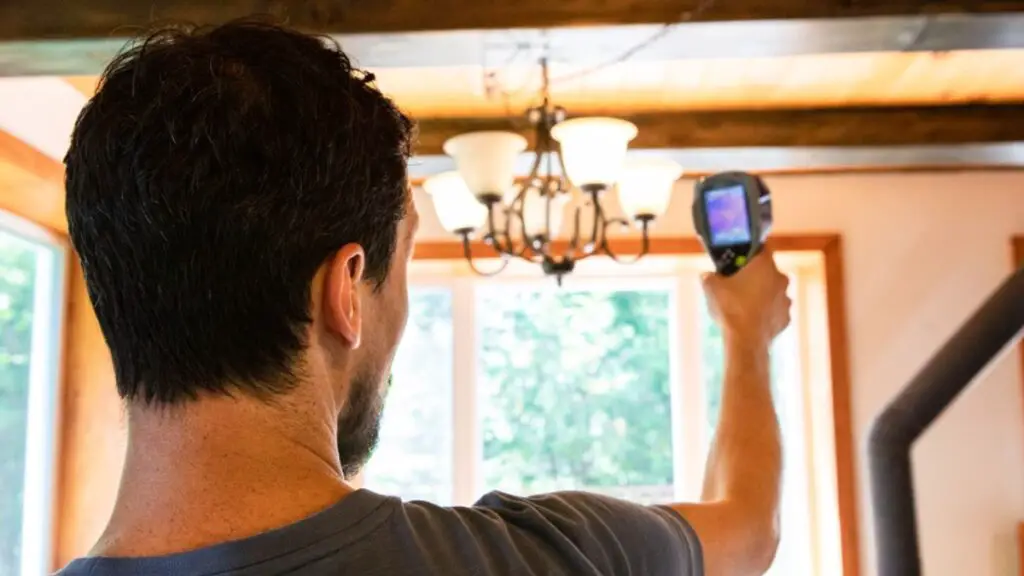
Common Reasons Homes Fail Inspection
Here are 21 reasons homes fail inspection, causing buyers to walk away from a home purchase.
- Water Damage: One of the most serious and financially damaging issues in a home inspection is water damage. It can cause significant problems such as foundation damage and mold growth.
- Building Structure Issues: The structural integrity of a house is crucial, and any foundation cracks or damage to walls, floors, or roofs can be a major red flag. Major structural settlement and foundation issues can cost thousands of dollars to correct.
- Roofing Issues: A bad roof can be a deal breaker, leading to costly repairs or replacement. It’s important to check for signs of roof damage, such as leaks or deteriorated shingles.
- Electrical Issues: Electrical problems are hazardous and can pose a risk to the safety of the occupants. A qualified electrician should inspect and update outdated electrical panels or faulty electrical wiring.
- Plumbing Issues: Faulty pipes and hidden leaks can lead to water damage and other problems. Issues with pipes, sewer lines, gas lines, or water heaters should be addressed before closing the deal. Gas leaks and carbon monoxide poisoning can be life-threatening.
- Mechanical Issues: HVAC systems and ductwork should be in working order to ensure proper air quality and temperature regulation in the home. Problems with the furnace or air conditioning are often red flags because of their high replacement cost.
- Drainage Issues: Poor drainage can cause water damage and compromise the property’s structural integrity. It’s important to address any drainage problems to prevent future issues.
- Termites and Wood Destroying Organisms: Infestations by pests like termites can cause significant damage to the structure of a home and require costly repairs. According to the University of Kentucky, the estimated annual cost of termite damage is in the billions. Pest damage can also cause foundation problems and rotting wood.
- Homes with Lead-Based Paint Issues: Homes built before 1978 may contain lead-based paint, which can be a health hazard. Testing and proper remediation should be conducted, especially if there’s peeling paint present.
- Mold Issues: Mold growth is often a sign of underlying water damage and can harm health and the home’s structural integrity.
- Failing Exterior Siding and Windows: Damaged or failing exterior siding and windows can lead to energy inefficiency, water leaks, and potential safety hazards.
- Chronic Wet Crawl Spaces: Wet crawl spaces can cause damage to the home’s structure and contribute to mold growth. Proper encapsulation is necessary to address this issue.
- Failing Septic System or Sewer Line: An old or failing septic system or sewer line can lead to costly repairs and potential health hazards. Inspection and necessary repairs should be carried out.
- Poor Water Quality from a Shallow Well: Shallow wells are more susceptible to contamination, and water quality should be tested to ensure safety.
- Outdated Water Heating System: Old water heaters may pose safety risks and require replacement to ensure efficient and safe operation.
- Asbestos in a Home: Asbestos is a hazardous material commonly found in older homes. Qualified contractors should conduct proper testing and removal.
- Unpermitted Building Additions: Unpermitted additions can be fire hazards and may not comply with building codes. Inspection and necessary permits should be obtained.
- Amateur & Subpar Workmanship of Repairs: Poorly executed repairs can lead to safety hazards or further damage. Qualified contractors should assess and rectify any amateur workmanship.
- Rodent Infestations: Rodents can cause damage to the property and pose health risks. Treatment by an exterminator should be conducted before closing the deal.
- Prior Meth House: Former meth houses may require professional cleaning and testing for contamination before closing the deal.
- High Radon Levels: Radon gas is a health hazard, and high levels require installing mitigation systems. Testing for radon should be conducted before closing the home.
Related Reading: Making Sense of Your Home Inspection Report
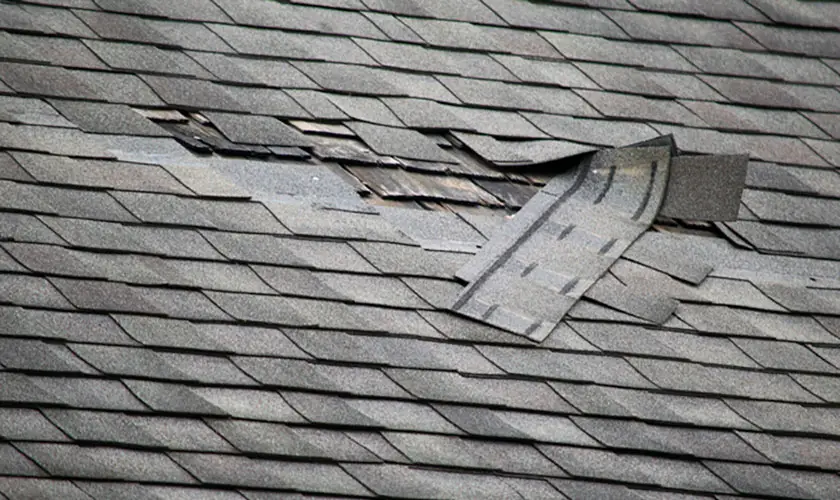
House Failed Inspection: Understanding Home Inspector Findings
Home inspections are subjective, and each inspector uses different terminology in their reports. Inconsistencies in the slope of the property or the heaviness of tree roots can be reported differently. If your home inspection results seem alarming, here are some questions you should ask before making your final purchase decision:
- Is the deficiency a code violation? All existing homes likely have some building code violations. This is because building codes are updated every few years. Building code enforcement only applies to new home construction or renovation projects that exceed cosmetic improvements.
- Is this a structural deficiency? Structural deficiencies refer to failures in building components, such as foundation cracks, wood rot in framing, subflooring, or repairs not done following good building practices.
- Is this a safety issue? Safety hazards include uneven walking surfaces, electrical shock risks, or missing smoke detectors. These are usually noted in your home inspection report under “Safety Concerns,” “Improvements,” or “Recommended Items.” They are alerts about existing conditions, not necessarily calls for immediate repairs.
- Is this a cosmetic concern? Cosmetic issues are non-structural defects related to taste or age. These include wall and ceiling settlement cracks, which are aesthetic concerns, not structural problems.
- Do outdated systems require an update now? Every system in your home has a finite lifespan. Your home inspector will note the age of each system and whether it functions correctly during testing. Predicting when a repair or replacement will be necessary isn’t an exact science. You might have a water heater that’s 20 years old and still in tip-top shape, while a heat pump could fail in as little as six years.
- Is the home priced accordingly for its condition? This depends on your location. A real estate agent uses market conditions to set a sales price. The real estate appraiser establishes market value based on what similar homes have sold for.
Whether these issues are red flags, like moldy materials, is subjective. The home inspection contingency period allows prospective buyers to have a professional house inspection. You might negotiate a fair deal for needed repairs or even find a bargain if you’re willing to handle some significant issues.
Older houses don’t have to meet current building codes, and home inspectors rarely cite code violations. However, a significant issue can also be a safety concern. For example, an old breaker box can be a fire hazard, but electrical system upgrades are usually required only during planned renovations.
If you suspect a specific issue with the property, such as a problem with the ground slope or menace of tree roots, consider hiring a specialist to accompany the home inspector for a more thorough analysis. If you believe the structural integrity of your basement is compromised, a qualified structural engineer can provide a more detailed assessment than a general home inspector.
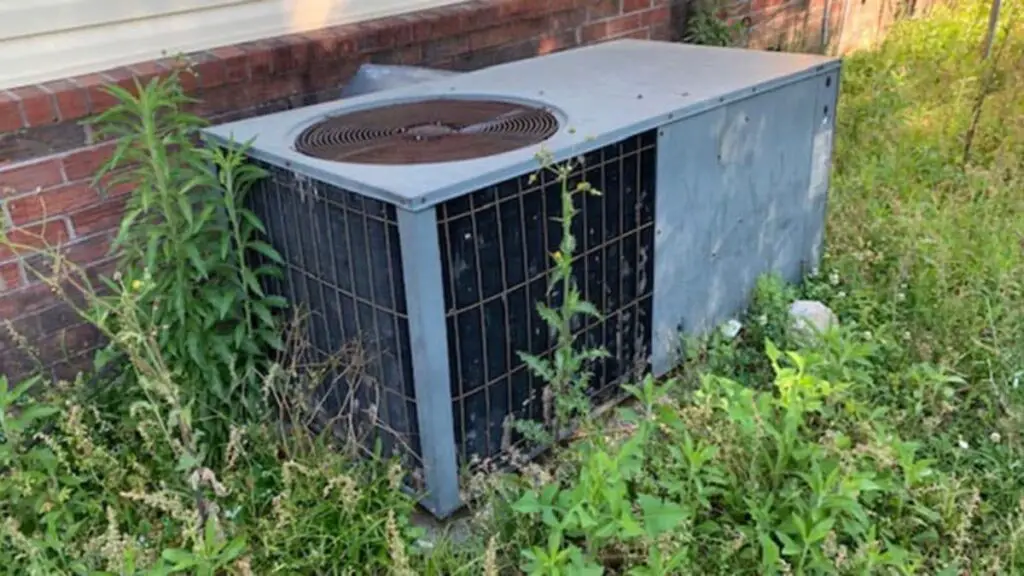
Understanding Home Inspectors Findings
Most real estate agents will tell you that failed home inspections happen often. They’re right, sort of. Home inspections fail, or at least they seem to, all the time.
But the truth is, you can’t pass inspection or fail inspection. Home inspectors don’t issue a passing or failing grade for home inspections. They offer a professional opinion of the house and document their findings and safety concerns.
A home inspector examines the condition of a house and whether or not the systems and components are in working order.
It’s important to remember that no house is perfect. Every house, regardless of age, has some defects or deficiencies. However, just because you can not pass or fail a home inspection, a home inspection can still go wrong and become a deal breaker.
Just because a home inspector notes that repairs are recommended doesn’t mean the seller is obligated to fix anything. However, if a seller refuses to make repairs, the buyer may decide to walk away from the deal.
Home Inspectors Don’t Fail a Home Inspection
It’s important to remember that no house is perfect, including new ones. People build houses, and people aren’t perfect. You can fix all items in home inspection reports.
The information in an inspection report allows you to set the terms you can accept. Most purchase agreements have a home inspection contingency. If you have a set of terms in mind and the seller agrees, don’t try to squeeze out more concessions and turn sour negotiations between you and the seller.
Just because a home inspector notes that repairs are recommended doesn’t mean the seller is obligated to fix anything. However, if a seller refuses to make repairs, like faulty outlets or damp materials attracting mildew, the buyer may decide to walk away from the deal.
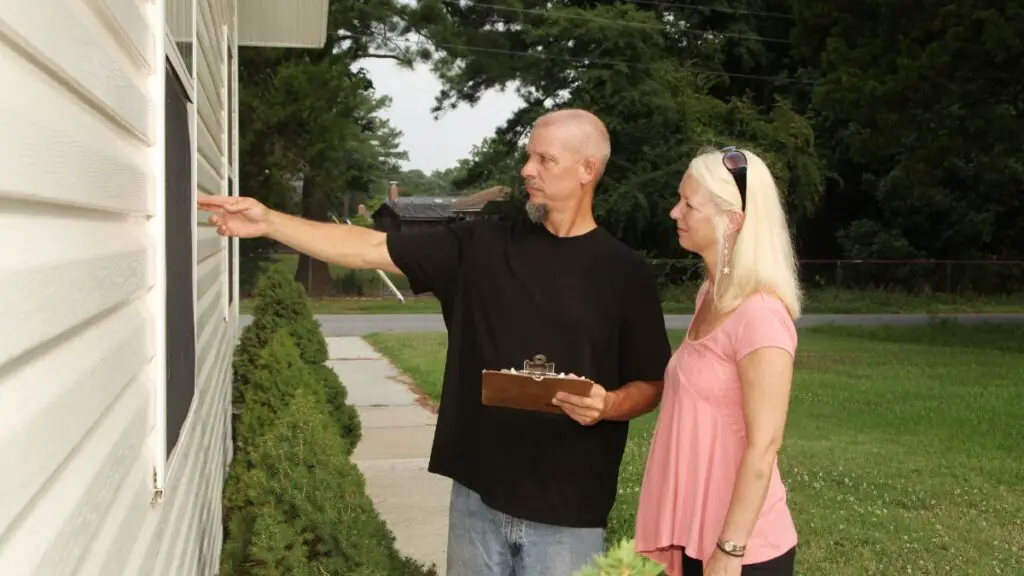
Buyers: Be Willing to Walk Away
Once you obtain a licensed contractor’s repair bid and have a firm number in mind, it’s time to negotiate. To give you some room to maneuver, ask for slightly more, allowing room for a seller’s counteroffer, and eventually, you should end up close to your desired number.
If seller negotiations aren’t going well, you fear losing the house if you can’t make a deal. This is particularly concerning for homeowners when foundation or HVAC problems arise, as these major issues can be costly.
Being an excellent negotiator means taking all the emotion out of your decisions. You may need to be willing to walk away. Frequently, if a seller senses you’re about to walk away from the deal and risk losing the contract, their willingness to meet your request may change.
It’s key to remember that areas of the house prone to moisture, such as basements, require added insulation and proper ventilation, and these enhancements must be factored into your negotiations.
Remember, local market conditions can play a role as well. If you’re in a multiple-offer scenario, sellers are less likely to negotiate home inspection repairs because they have backup offers waiting in the wing. Things like home appliance faults, poor property grading, and chimney issues can be potential deal breakers for potential home buyers.
Related Reading: 7 Red Flags to Walk Away After a Home Inspection
FAQs
Here are some additional questions you may have when considering the things that fail a home inspection.
What red flags should you be concerned with?
Some common things that home inspectors look for are water damage, mold, rot, or structural issues. They also check for electrical, plumbing pipes, heating, and cooling systems. Home inspectors pay close attention to a home’s foundation, framing, and roofing. If they see any of these problems, it might indicate that the home has other serious issues.
What are common things that come up in an inspection?
Some common things in a home inspection are bad GFCIs, roof leaks, small plumbing leaks, bad weather stripping, faulty wiring, wood rot around doors and windows, etc. These are typically minor repairs that the seller can easily fix before the buyer moves in. However, if unaddressed, these home inspection problems could lead to more serious issues.
What repairs should you ask the seller to fix?
You should ask the seller to fix any major problems found during the home inspection process. Often, you’ll negotiate these repairs and settle on a compromise that results in a repair credit or a price reduction.
Conclusion
A home inspection highlights potential property issues, some easily visible and some not. These assessments sometimes highlight red flags like water damage, mold, and faulty electric and plumbing systems.
Whether these red flags are things that fail a home inspection or become a deal breaker for the home buyer largely depends on expectations and the severity of the issue.
The whole idea of a home inspection is to give the home buyer the information they need to decide on the potential life-changing purchase they are about to make. As you may know, no home is perfect, and almost every inspection will return some issues.
However, some home inspection problems are more severe than others, which needs to be considered during the sale negotiation process.
To the untrained eye, what might appear as a reasonably innocuous crack in the wall may be something far more sinister, such as severe structural damage or water penetration at the home’s foundation level.
Issues such as this can run up hefty repair bills in the thousands of dollars, which would turn your dream move into something of a total disaster.
Taking a home inspector with you is even more essential when purchasing an older property. Old electrical and plumbing practices have now been rendered obsolete by modern-day standards.




